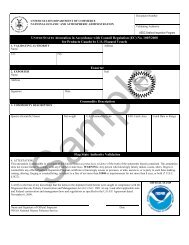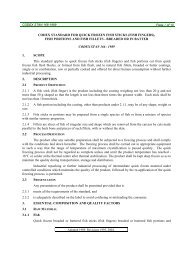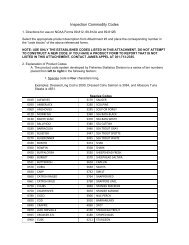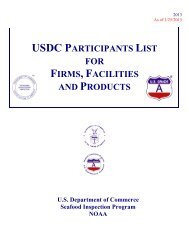Customs Labeling - Seafood Inspection Program
Customs Labeling - Seafood Inspection Program
Customs Labeling - Seafood Inspection Program
Create successful ePaper yourself
Turn your PDF publications into a flip-book with our unique Google optimized e-Paper software.
product will be repacked prior to sale to the ultimate purchaser, the importer must certify to<br />
<strong>Customs</strong> that he will properly mark the new package or alternatively notify the repacker of the<br />
obligation to mark the new package. The certification procedures, which are for the purpose of<br />
ensuring that despite the repacking, the ultimate purchaser will be advised of the country of origin,<br />
apply to imported J-list articles processed and repacked after importation unless the articles are substantially<br />
transformed prior to repacking. Absent a substantial transformation, the consumer or other<br />
recipient of the shrimp is considered the ultimate purchaser and is entitled to be informed of the<br />
country of origin of the shrimp.<br />
In order for a substantial transformation to be found, an article having a new name, character<br />
and use must emerge from the processing. See United States v. Gibson-Thomsen Co, Inc, 27<br />
C.C.P.A. 267, C.A.D. 98 (1940). The issue before the <strong>Customs</strong> Court in that case was whether<br />
hairbrushes and toothbrushes manufactured in the U.S. by inserting bristles into wooden handles<br />
imported from Japan were required to be marked as products of Japan. After careful examination of<br />
the statute and its legislative history, the court concluded that Congress had not intended the marking<br />
requirements to continue to apply to an imported article which is used in the U.S. as a material in the<br />
manufacture of a new article having a new name, character and use, and which consequently loses its<br />
separate identity in the finished product.<br />
This decision was followed and quoted extensively in Grafton Spools, Ltd. v. United States, 45<br />
Cust. Ct. 16, 22, C.D. 2190 (1960), in which empty metal spools imported from England and<br />
wrapped in the U.S. with inked ribbons to create typewriter ribbons and business machine ribbons<br />
were found to have lost their identity in the finished product. The court observed that what the<br />
ribbon manufacturers were selling were ribbons, which of course had to be wound on a spool, but it<br />
was the ribbon and not the spool which the manufacturer's customers were interested in purchasing.<br />
A more recent court decision on the issue of country of origin marking is Uniroyal Inc. v.<br />
United States, 3 C.I.T. 220, 542 F. Supp. 1026 (1982), aff'd, 702 F.2d 1022 (Fed Cir. 1983). In this<br />
case the merchandise before the Court of International Trade consisted of "footwear uppers<br />
consisting of complete shoes except for an outsole ....," manufactured in Indonesia and imported into<br />
the U.S. where a preshaped rubber outsole was affixed and the complete shoe was sold to retailers.<br />
The question was whether the addition of the outsoles substantially transformed the uppers so that<br />
the uppers did not have to be individually marked as a product of Indonesia.<br />
After carefully examining both the imported upper and the finished shoe, the court concluded<br />
that the imported upper did not lose its distinct identity in the finished shoe and to the contrary, was<br />
the very essence of the completed shoe. This was so even though the imported upper could not be<br />
sold to or worn by consumers without the heavy rubber outsole being attached and even though<br />
following attachment of the rubber outsole the shoe was called by a different name, a deck shoe,<br />
rather than an upper or a moccasin.<br />
-4-<br />
In the most recent court decision involving a country of origin marking question, National<br />
Juice Products Association v. United States, supra, the Court of International Trade upheld <strong>Customs</strong><br />
determination that imported orange juice concentrate is not substantially transformed when it is






